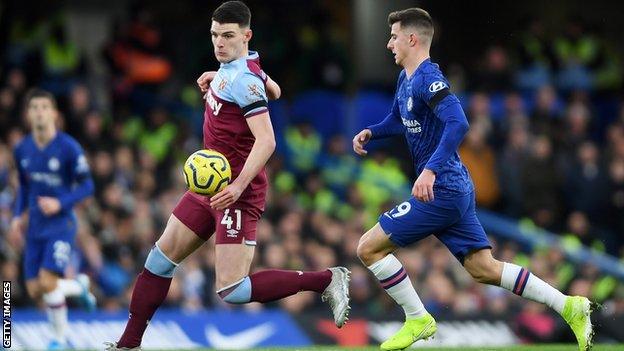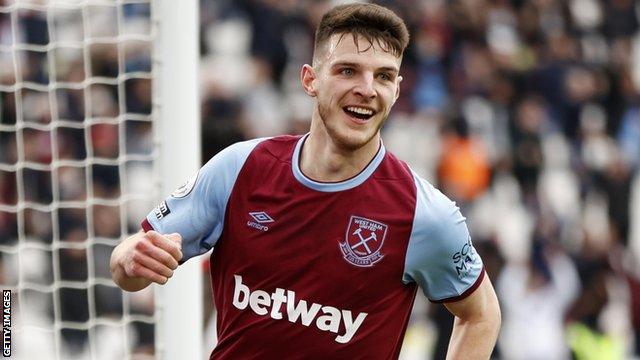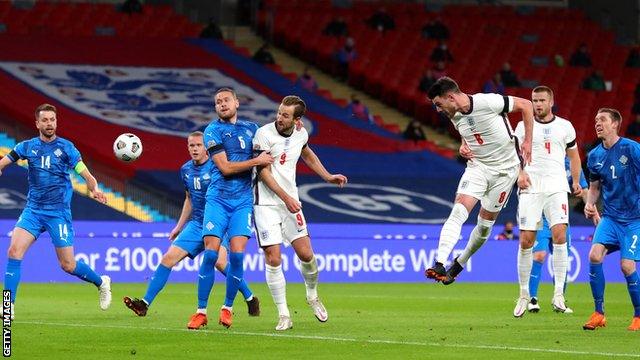Declan Rice: How England midfielder overcame rejection to become key Euro 2020 figure
- Published

Rice and England team-mate Mason Mount (right) are close friends from their early days at Chelsea
Euro 2020 on the BBC |
|---|
Dates: Friday, 11 June-Sunday, 11 July. Host cities: London, Rome, Munich, Baku, St-Petersburg, Budapest, Seville, Bucharest, Amsterdam, Glasgow, Copenhagen. Coverage: Live on BBC TV, BBC Radio 5 Live, iPlayer and BBC Sport website. Click here for more details |
"We called it a skills test because that's what the players thought it was," says Trevor Bumstead, a former West Ham United youth coach. "But really it was about perseverance, determination."
Eight stations were set up around the pitch. The club's under-15 boys were each given a ball and told to work their way around the circuit until every task was completed.
At one station, they had to curl their ball into the goal from the corner flag, with their left foot and then their right. At others, they had to shoot through hoops placed over the corners of the net, or execute precise clipped or driven passes toward a target.
And it was in these sessions that Declan Rice demonstrated the persistence and drive for improvement that have seen him develop into a key midfielder for England going into Euro 2020 and a standout Premier League talent reportedly valued upwards of £80m.
"There was an element of skill to it," Bumstead says, "but you had to go and get your ball every time you missed.
"He was fantastic at that because he'd miss, and then he'd bring back his ball and have another go. But he used to assess very quickly what he'd done wrong and readjust.
"It was about: Can you keep doing it? Who is going to be the most persistent? That was the competitive element. And Declan would always win those. He was fiercely competitive."
That competitive fire, it seems, emanated from a sheer love of the game.
By the time he enrolled at Grey Court School in Ham, London, as an 11-year-old, Rice was already an academy player for Chelsea, the club he grew up supporting.
His thirst for football was insatiable. He was insistent on representing his school and his club - on the same day.
On regular Tuesday evenings, Rice would play a full game for Grey Court, after which his mum, Theresa, would come to collect him, passing him his Chelsea kit and a tub of pasta before whisking him off to training at the club's Cobham academy.
"He wanted to play every minute of every game, even though he was still at Chelsea," remembers Steve Willmore, Rice's PE teacher and football coach at Grey Court. "School football for him was still incredibly important.
"He was an outstanding player, but what stood out as well was his workrate. He was an all-action midfielder. He was up and down, left and right foot - he could do it all."
Willmore remembers having to substitute Rice 10 minutes into a local derby against Orleans Park School because he'd scored four goals. "It was too easy and not fair to keep him on," the teacher says.
And when Rice shone in a game against Whitgift School from Croydon, whose line-up included boys on the books of Chelsea and Crystal Palace, Willmore says "you knew you had a special player".
Martin Taylor, a former scouting co-ordinator at Chelsea, saw great potential in Rice at that stage, too.
"I always saw him as a player who could play at the top level because of the desire he's got," Taylor says. "Nothing fazes him. He's got a winning mentality.
"He was always the rock in midfield. He'd win the ball, break it up, win tackles. Not a flair player. He never did anything out of the ordinary, but what he did, he did well. You could always see he was going to play at a good level."
Moyes’ home truths turned Hammers around - Rice
But at 14, Rice lagged behind his peers physically. Although an intelligent and tenacious footballer, he was undersized and lacked the striking athleticism of Chelsea's best prospects. The club released him.
The news he had been let go by his boyhood club was crushing, stripping him away from an environment in which he was an immensely popular figure - not least with Mason Mount, who remains his best friend - and halting his dream of progressing to the Stamford Bridge first team.
Despite the painful rejection, though, Rice accepted Chelsea's decision and redoubled his resolve.
Bouncing back quickly, he trained briefly with Fulham before signing for West Ham.
"There had been a lot of scouting of him," remembers Dave Hunt, West Ham's head of academy recruitment. "When he popped out at under-14, I was quite shocked at the time but acted quickly to get him in the next day. It was that quick. I spoke to him the next day and he came in that week.
"Yes, it was hard for any player to be released by the club they supported. But in typical Rice fashion, he just got on with it. Didn't blame anyone. Didn't bear a grudge. He just used it as a springboard for him to go on and develop."
Vashon Neufville, a defender who played alongside Rice at Chelsea before the pair were reunited at West Ham, recalls: "I was surprised when I heard he'd been let go.

Rice has scored five goals and provided four assists in 131 Premier League appearances
"It was two years after I left [Chelsea] that he came [to West Ham]. He just turned up at training one day and we just started smiling and catching up with each other. He was gutted at first, but he just took it on the chin and kept going."
Rice settled quickly at West Ham, becoming part of the first intake to the club's new schooling programme, leaving his family home to move into club accommodation across London and joining the affiliated Robert Clack School in Dagenham.
England's Euro 2020 Group D fixtures (all at Wembley) | ||
|---|---|---|
Sunday, 13 June | Croatia | 14:00 BST |
Friday, 18 June | Scotland | 20:00 BST |
Tuesday, 22 June | Czech Republic | 20:00 BST |
He impressed his new coaches with his work ethic and tenacity on the pitch, and with his empathy and unselfishness off it.
"When one of the boys was struggling in the house," Hunt recalls, "he rang me and said, 'Dave, I think he's struggling. He's in tears. Can you come and see him?' Things like that he didn't need to do as a 15, 16-year-old.
"I look back at the Under-23 Premier League 2 play-off final in 2017, when we beat Newcastle at St James' Park. He was excellent in the game. There was a young West Ham fan there, five or six years old.
"As soon as the game was won, him and [team-mate] Dan Kemp turned and jumped over the hoardings, ran up into the stands and gave the boy their shin pads.
"To be able to deliver in a final like that and then have the humility to go and make a young boy's day, that was the biggest thing for me."
Still, while Rice's technical talent and mental fortitude were abundantly clear, the physical concerns that led to his release by Chelsea persisted in his early years at West Ham.
"He was very skinny, wiry, small," Bumstead says. "Nothing like he is today. He had some things about him that we really liked.
"He was very confident. He already had some leadership skills at that point. He was a good decision-maker. But he struggled to affect games because of his lack of physicality.
"We liked his personality and character. That was really important to us at the time. We were looking for boys who were good decision-makers. We weren't too worried about a lack of physicality; we knew that would come."
Too much abuse on social media - Rice
When a belated growth spurt kicked in, Rice's development accelerated. International recognition arrived at under-16 level, where, through his grandparents' nationality, he represented the Republic of Ireland - for whom he would later play three senior friendlies before switching allegiance to England.
And at club level, a burgeoning degree of physicality finally enabled him to separate himself from his peers as a prospect of the highest potential.
"From the ages of 16 to 18, he started developing really well," Neufville says. "He's always been a technical player, very good with the ball. He wasn't always the fastest, so he started figuring out the game to play his position better."
Bumstead says: "I remember going to an under-16 tournament in Denmark. We won the tournament. He was outstanding.
"We had Reece Oxford in that group, and Reece was touted to be the next big thing - he was already captain of our Under-23 side. But Declan was the outstanding player on the trip.

Rice made his England debut at the age of 20 and scored his first senor goal for his country against Iceland in November 2020
"That was the turning point for Declan in the second half of that year. People started to take notice of him a bit more and he started to gain a bit of physicality to his game. He started to make a real imprint on matches."
Even after his sustained first-team breakthrough in the 2017-18 season, Rice refused to settle into a comfort zone.
He has established himself as one of the Premier League's finest ball-winning midfielders while also this season showing marked improvements in his ability to instigate attacking moves from deep positions through piercing forward passes and driving runs.
With the 22-year-old set to be central to England's hopes of success at this summer's European Championship, those who have worked closely with Rice along his rise are certain his drive to improve won't find its limit any time soon.
"A lot of players who are more talented than him don't get as far as he has gone," Taylor suggests, "because they don't have the character and desire that he's got."
"In coaching," concludes Bumstead, "we speak a lot about having outstanding attributes. Declan's aren't technical attributes. It's his character, determination and personality. That's why he'll become an even better player as his career develops."

Sport's Strangest Crimes: Vanilla Ice looks into the disappearance of the prized racehorse Shergar
"Be your 100% authentic self": Gay former rugby league player Keegan Hirst speaks to his younger self
